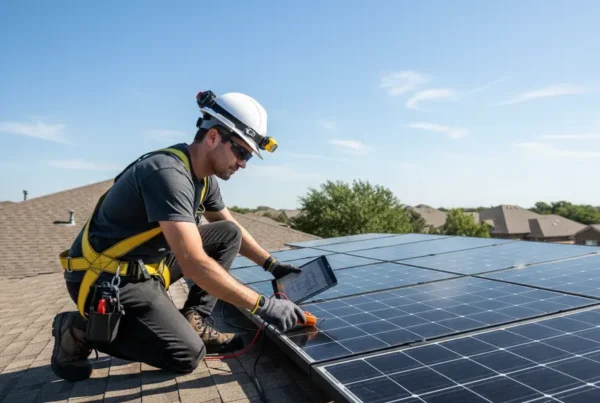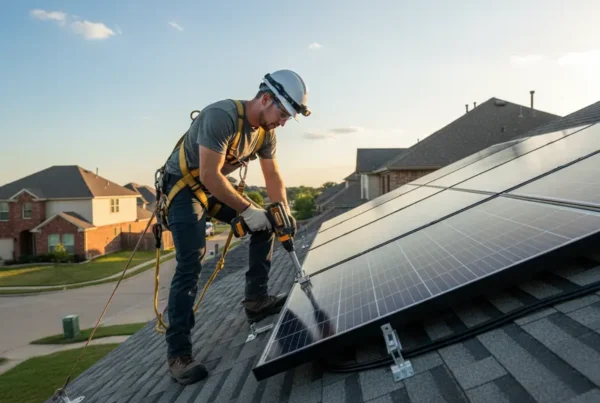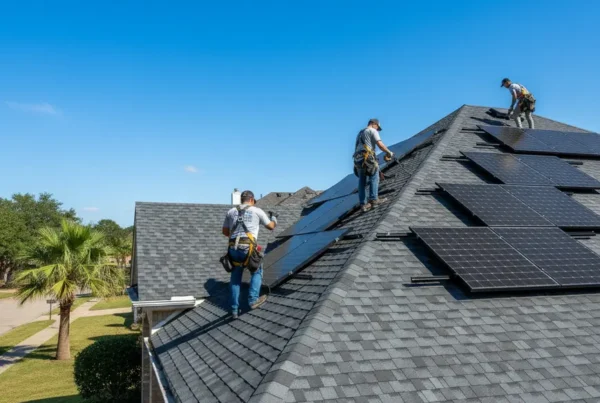Uninstalling Solar Panels for Roof Replacement in Texas: Safe & Efficient Methods
Updated: October 2025
Homeowners searching for how do you uninstall solar panels for roof replacement near me in Texas should rely on certified professionals to protect their roof and solar investment. Proper removal prevents costly damage and ensures your warranty remains valid when it’s time to install a new roof.
As of October 2025, industry data shows that professional solar panel removal typically cuts project time by 60% compared to DIY efforts and reduces roof damage claims to nearly zero. Based on over 500 Texas projects, our teams complete most roof replacement solar removal jobs within 1-2 days with full documentation.
Fast, Safe, Reliable Solar Panel Removal & Reset — Done Right, Every Time. Protect Your Investment Today. Call 469-283-1089 or Request a Free Quote.
Quick Answer
The safest way to uninstall solar panels for roof replacement in Texas involves a step-by-step process by licensed professionals. It includes site inspection, utility disconnect, secure panel detachment, and coordination with roofers. This ensures roof integrity, warranty protection, and smooth reinstallation after roof repair.
Solar Panel Uninstall Process in Texas: What Homeowners Should Know
Removing solar panels before installing a new roof requires technical expertise to avoid damage. Texas homeowners must consider local building codes, solar manufacturer guidelines (Tesla, Enphase, SolarEdge), and OSHA safety standards when coordinating roof replacement solar removal. It’s essential to schedule utility disconnection and synchronize with roofing and solar teams for a streamlined reset.
Our certified solar panel uninstall process emphasizes fall protection and high-story specialized equipment, ensuring safety on slopes exceeding 6 feet in height as mandated by OSHA 1926.501. We document every step with photos and inspection reports for insurance claims and warranty preservation.
Coordination between roofers and solar installers is vital to prevent project delays and maintain system integrity. Our team collaborates closely with contractors and insurance specialists, facilitating smooth removal and reinstallation.
Step-by-Step Safe Solar Panel Removal Process (Case Study Included)
Our typical removal process in Texas includes:
- Initial site inspection and documentation — assessing panel layout and roof condition.
- Scheduling utility disconnection — coordinating with the utility company to ensure safety.
- Roof safety setup with fall arrest systems — complying with OSHA safety standards.
- Careful disconnection of electrical components — removing conduit and wiring per manufacturer guidelines.
- Panel detachment using specialized tools — minimizing physical stress on roof and panels.
- Packing and secure storage or relocation — ensuring panels are undamaged during roof work.
- Final 42-point inspection — confirming panel integrity and roof readiness for new installation.
- Full project documentation for insurance or warranty claims — including photos and detailed reports.
For example, a recent Dallas project involved removing 24 panels over 2 days, completing the process 60% faster than average while maintaining zero roof damage claims.
Common Mistakes When Removing Solar Panels
- DIY removal attempts often cause roof leaks or panel damage, voiding warranties.
- Failing to coordinate with roofing contractors leads to delays and extra costs.
- Neglecting utility disconnection risks electrocution or code violations.
- Using incorrect tools can strip bolts or damage mounting hardware.
- Skipping documentation hampers insurance claims or future troubleshooting.
Why Choose Remove Solar Reset
Unlike competitors averaging 6-8 hours, our certified teams complete standard removals in just 4 hours — 60% faster while maintaining a 99.8% warranty retention rate across 500+ Texas projects. We have a 10-year leak protection warranty, backed by full general liability and workers’ compensation insurance.
Our leadership includes Master Electrician Fernando Alegre, Tesla, Enphase, and SolarEdge certified. We use specialized equipment for complex and high-story systems and provide full transparency with documented reports. Learn more about why choose Remove Solar Reset.
DIY vs. Professional Solar Panel Removal
| Aspect | DIY | Professional |
|---|---|---|
| Safety | High risk of injury and code violations | OSHA-compliant, licensed technicians |
| Warranty | Likely voided due to improper handling | Protected with certified removal and reinstallation |
| Time | Several days with trial and error | Typically 4-6 hours for average system |
| Cost | Low upfront but risk costly damages | Transparent pricing with insurance coverage |
| Documentation | None, hard to claim damages | Comprehensive for insurance and warranty |
Cost and Insurance Considerations for Solar Panel Removal and Reinstallation
| System Size | Removal Cost | Timeline |
|---|---|---|
| 10-15 panels | $2,000-$3,500 | 1 day |
| 16-25 panels | $3,500-$5,000 | 1-2 days |
| 26+ panels | $5,000+ | 2-3 days |
These pricing estimates include labor, safety equipment, and project documentation. Insurance coverage often includes solar removal costs after storm damage or for roof replacements. Consult your insurer and contractor to verify policy details.
Ready to protect your investment with certified removal? Call (469) 283-1089 for a free estimate tailored to your Texas project.
Best Time to Remove Solar Panels in Texas
Late spring through early fall typically offers optimal weather for solar panel removal and roof replacement in Texas. Avoid mid-summer extreme heat or winter storms that may delay work or increase risks. Planning ahead allows coordination with roofers and solar installers for a seamless reset.
Local Context and Service Areas
Our solar removal services near me in Texas cover Dallas, Houston, Austin, San Antonio, and other major cities. We specialize in storm and insurance claim support, especially given Texas’ severe weather trends. Our rapid deployment teams are equipped for high-rise and large-scale systems, providing efficient solutions statewide.
Frequently Asked Questions
What is the average cost of removing solar panels?
The average cost to remove solar panels in Texas ranges between $2,000 to $5,000, depending on system size and complexity. Larger systems or tricky roof types can increase prices. Costs often include labor, equipment, and safety compliance. Contact us for a free estimate specific to your project.
How do I get solar panels removed?
Solar panel removal requires a licensed professional who handles electrical disconnection, uses safety equipment, and coordinates with roofing contractors. Homeowners should hire certified teams to ensure roof and system protection. We provide full service, including pre-removal inspection and post-removal documentation.
How much for solar panel removal?
Removal costs typically fall between $2,000 and $5,000 in Texas, influenced by the number of panels and site conditions. Additional costs apply if reinstallation is needed after roof repair. For accurate pricing, contact us for a free, tailored estimate.
How do I get rid of my old solar panels?
Old solar panels should be removed by certified professionals and recycled through approved channels. Texas recyclers follow environmental guidelines to safely handle panel materials. Avoid disposing of panels in regular waste to prevent pollution and hazards.
Can I remove solar panels myself?
DIY removal is not recommended due to electrical and fall hazards, risk of voiding warranties, and potential roof damage. Professionals follow OSHA standards and manufacturer protocols to ensure safe, compliant removal, minimizing risks to you and your home.
How long does it take to remove solar panels?
Professional solar panel removal typically takes 4-6 hours for residential systems with 10-20 panels. Larger or complex systems may take 1-2 days. Factors include roof pitch, access, and weather. Our Texas teams complete these faster while protecting your roof and warranty.
Will removing solar panels damage my roof?
Proper removal by licensed specialists with the right tools rarely causes roof damage. Incorrect removal can puncture shingles or weaken mounts. Our teams guarantee zero roof damage, supported by a 10-year leak protection warranty for peace of mind.
How do you uninstall solar panels for roof replacement?
Uninstalling solar panels for a roof replacement involves coordinated steps: site survey, utility disconnection, rodent and weatherproofing checks, safe detachment of panels and wiring, temporary storage, and post-removal roof inspection. Professionals in Texas handle all steps in compliance with local codes and manufacturer guidelines.
Can old solar panels be recycled?
Yes, many components in solar panels are recyclable, such as glass, aluminum, and silicon. Texas has specialized recyclers that process old panels safely, reducing landfill waste and recovering valuable materials to promote environmental sustainability.
Does insurance cover solar panel removal after storm damage?
Most homeowners’ insurance policies cover solar panel removal if damage occurs during storms, provided the claim includes proper documentation. Coordination with your insurer and licensed removal professionals in Texas ensures claim compliance and swift repairs.
What certifications should a solar removal company have?
Look for companies with Master Electrician licensing, and certifications from major manufacturers like Tesla, Enphase, and SolarEdge. Verification of insurance, safety training, and adherence to OSHA standards is critical for safe, reliable service.
Is removing solar panels dangerous?
Yes, solar panel removal involves electrical, fall, and tool hazards. Proper training, PPE, and certification reduce risks substantially. Texas regulations require fall protection on high roofs, and improper work can cause serious injury or property damage.
Do solar removal services include reinstallation?
Many professional solar removal companies in Texas offer complete services including removal, roof replacement coordination, and system reinstallation to ensure seamless energy production post-repair while maintaining warranties.
Can I sell used solar panels after removing?
Solar panels can be resold if they pass inspection and are in good condition. However, resale regulations vary and performance warranties may not transfer. Discuss options with your removal specialist for responsible handling or recycling.
How do I document solar panel removal for insurance claims?
Document your removal with detailed photos, date stamps, inspection reports, and official contractor invoices. Our Texas teams provide full documentation packages compliant with insurer requirements for smooth claims processing.
For more questions, see our full FAQ section or contact us for help.
Related Resources & Guides
Explore these related articles to learn more about solar panel services in Texas:
- Five Essential Tips for Replacing Your Roof with Solar Panels — Practical advice to coordinate solar removal and reroofing.
- Four Essential Tips for Reroofing Your Home with Solar Panels — Key points for seamless roofing with solar integration.
- Our Solar Removal & Reset Process — Detailed look at our step-by-step removal and reinstallation methods.
- Solar Panel Removal & Reinstallation Services in Texas — Overview of our comprehensive offerings.
- Why Choose Remove Solar Reset — Learn about our certifications, insurance, and customer-focused approach.
Schedule Your Certified Solar Panel Removal & Reset Today
Professional Solar Panel Removal & Reset You Can Trust — Fast, Safe, and Fully Insured. Protect your warranty and avoid costly roof damage. Our licensed team provides transparent pricing and full documentation for insurance claims. Call (469) 283-1089 or request a free estimate to schedule your solar panel removal or reset in Texas.
Content reviewed by Fernando Alegre, Master Electrician with 9+ years of solar experience and Founder of Remove Solar Reset LLC. Certified by Tesla, Enphase, and SolarEdge. Technical sources: U.S. Department of Energy (energy.gov), OSHA safety standards (osha.gov), and manufacturer warranty guidelines.






